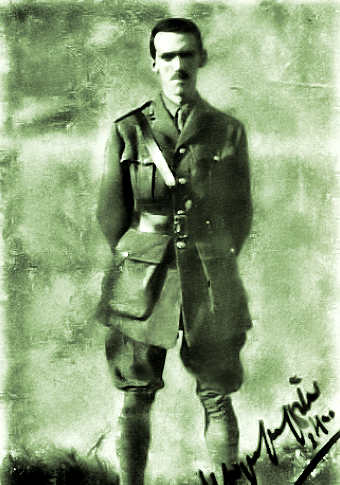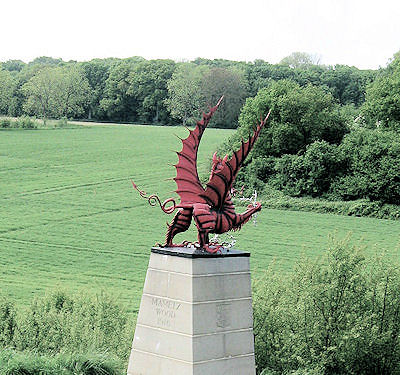 |
| Lt. Griffith |
Llewelyn Wyn Griffith served as an infantry officer in the 15th Royal Welsh Fusiliers during the war. After rising to company command, he was assigned as a staff officer during the fighting for Mametz Wood in July 1916. Wyn Griffith was a poet and author, and his memoir, Up to Mametz, was originally published 1931. This current edition includes an update entitled “Beyond Mametz” that was begun by Wyn Griffith after World War II and is here ghostwritten by the editor of this volume, Jonathon Riley. Riley, a retired British Army lieutenant general, author, and historian, does a fine job of editing and annotating this edition.
Wyn Griffith’s memoir is a simple chronological account of his service as an infantry officer in 1915 and 1916 and as a staff officer thereafter. He gives us a wonderful insight into the world of a junior British infantry officer in the trenches. The author is perhaps at his best when he describes mind and body-numbing days of utter fatigue in the trenches. When discoursing of mud in the trenches, Wyn Griffith writes:
[W]e turned again to our daily task of unending displacement of mud. We filled sandbags with it, piled them up into a wall, beat them into a firm rampart, there to remain until a shell-burst undid our efforts. Then our damaged wall would sag and drop, and our labour in lifting mud three or four feet above its original resting place was made waste [p. 60].
Wyn Griffith then goes on to humorously describe the infantry’s frustrating interactions with engineers as they sought to buttress the mud walls of the trenches.
 |
| The Welsh Memorial Overlooks the Site of the 7 July 1916 Attack on Mametz Wood by the 38th Division |
In addition to the fatigue of trench duty, the author also recounts his interactions with Town Majors, staff officers, adjutants, and senior commanders. Wyn Griffith was detailed as a staff officer in June 1916, just before the battle for Mametz Wood. His narrative now shifts to a broader perspective, and his apt descriptions of military service extend to his new role. One can feel the exasperation felt by officers and men in Wyn Griffith’s description of the situation when a detailed artillery support plan went wrong at the beginning of the fighting near Mametz Wood: “The elaborate timetable suddenly became a thing of no meaning, as unrelated to our condition as one of Napoleon’s orders…” (p. 104).
Wyn Griffith’s assessments of senior officers are frank and enlightening. His description of corps commander General Sir Aylmer Hunter-Weston’s bizarre micromanagement will infuriate even those who have not experienced such a leadership style. On the other hand, the author gives an approving description of General Sir Alexander Godley’s handling of his corps from a relatively advanced command post during the fighting in April 1918. Thus, while Wyn Griffith is critical of the competence of many of the senior officers he encountered, it is probably a stretch to place him completely in the “lions led by donkeys” camp. At the very least, he balances his harsh assessments with honest views of the senior officers with whom he served as a staff officer. Indeed, editor Riley himself dismisses the “donkeys” viewpoint. In addition, Wyn Griffith greatly desired to become a red-tabbed staff officer, and this allowed him to write with some sympathy and understanding of that sometimes-hated breed.
In the second part of Up to Mametz, Wyn Griffith (with assistance from the editor) discusses his duty as a staff officer after Mametz. The author took part in the final German offensives of 1918 as well as the Allied drive beginning in July. During these final months of the war, the author gained experience working with Australians, Canadians, New Zealanders, and the French. The book concludes with Wyn Griffith returning to England where he resumed his work as a government tax inspector. Throughout the narrative, Wyn Griffith’s pride in his Welsh nationality shines through.
Readers familiar with the 1914 Christmas Truce will appreciate Riley’s interesting appendix that describes a similar but much smaller truce that occurred among Welsh, Scottish, and German soldiers the following Christmas. A number of photographs, illustrations, maps, and sketches, as well as a helpful bibliography, enhance the text. Wyn Griffith was a keen observer of life in the trenches with a writer’s flare for conveying the futility and fatigue that accompanied monotonous days struggling against mud and the elements; Pen and Sword has done a service for readers in reprinting Up to Mametz. I highly recommend it for anyone interested in reading about the experiences of British officers in the trenches.
Peter L. Belmonte

Excellent review. It's good to hear Welsh and Scottish voices in the literature of the Great War--they are too often included in the category of 'English'.
ReplyDelete